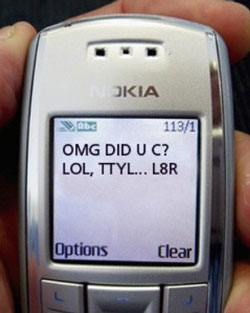 A lot of words in the English language need to be simplified, which usually means they need to be shortened. Perhaps Twitter and texting will finally make this happen. Twitter and texting ARE changing our language. And no need to get all huffy about it.
A lot of words in the English language need to be simplified, which usually means they need to be shortened. Perhaps Twitter and texting will finally make this happen. Twitter and texting ARE changing our language. And no need to get all huffy about it.
Language continually evolves anyway. Popular usage regularly determines what is acceptable. Such has been the pattern for hundreds of years (the King James Bible was written in what was that era’s common language, so contemporary usage has traveled far). This is not something to get snooty about and condemn, unless you’re an English teacher, in which case you may consider it your job. But keep an open mind.
Who wants to text “through” when “thru” gets the message across. As does “tho” for “though.” It’s all about communication. If the person on the other end knows what you’re saying, who cares whether Webster’s endorses the spelling? (Yes, you’re hearing this from a professional editor, who is supposed to be a fuddy-duddy.)
Lots of other words ending in “ght” need to be replaced with shorter words. I use these spellings all the time when texting and Facebooking (and ONLY when texting and Facebooking). Nite, mite, lite, rite, fite. Simplify, simplify! It’s a noble thing.
We’ve already simplified words from our previous British overlords, who steadfastly resist linguistic change. We took the unnecessary “u” out of a bunch of words–labour, colour, favour–and dropped the silent “e” from the end of “borne” and other words. Of course, in the age of Flickr, we could go a step furthr and make it labr, colr, favr. The Brits might actually settle for constructions like “labre” (I hereby reference “centre”), which may be an acceptable compromise for now. We can pick off the “e” later.
The Flickr example could spread to other words, like bittr, aftr, and forevr (not to be confused with 4evr). Thousands of people text like this every day. Don’t be surprised if it becomes the norm.
Then there are words like “neighbour,” which could be shortened all the way to nabor (remember Jim Neighbours, aka Gomer?). We changed the English “doughnut” to “donut” without triggering apocalyptic consequences.
Texters are also clipping silent letters from other words: I’v, hav, wil, com. I’m not there yet.
If the self-referential “I” can be spelled with just one letter, why can’t “you” become “U”? Why is that unreasonable? (But I don’t favor shortening “see” to “c” and “are” to “r.” I maintain my right to be inconsistent.)
Is it still necessary to use contractions? I think cant, dont, and even isnt get along just fine without apostrophes. (Somewhere, we went backwards in turning “an’t” into “ain’t.”) Young people get confused anyway about where to put the apostrophe, yielding such nails-on-chalkboards spellings as “is’nt.” (And I won’t even go to the Mother of All Transgressions May You Burn in Hades, adding apostrophe’s to mere plural’s. Usage cannot, and must not (or musnt) determine correctness in this case. On this hill shall I gladly die. )
I read that over the years, nearly 16,000 compound words have lost their hyphen. They actually started out as separate words, then married with a hyphen, and then eventually discarded the hyphen. I see nothing wrong with that. Leapfrog, makeover, postmodern, bumblebee, crybaby, homework, testtube, keypad, waterbed, pigeonhole, logjam. I’ve been writing “email” for years, knowing that that spelling will ultimately prevail, though style manuals and most magazines still cling to “e-mail.” I just don’t see the point of the hyphen, so I skip it. I don’t believe it confuses my readers.
I do draw the line at combining numbers and characters, like 2day and 4ever and sum1 and b4 and sk8 and gr8 (the numeral makes me strangely think of skeight and greight). However, I can see myself sliding into the habit of substituting numerals in the interests of quicker texting. Satan invented texting as a way to drive linguistic purists insane.
And there are other trends I’ll personally skip for now. Like scrapping the “g” in “ing” words. Like comin and goin, workin and drivin.
Of course, in professional/business communications, I use correct spellings. No sense in looking illiterate. But one of these days, at least some of these shorter words will become acceptable in business communications. And then, after another 20 years, Webster’s will get around to okaying it. Or OKing it. Whichevr.





